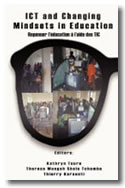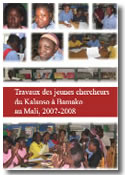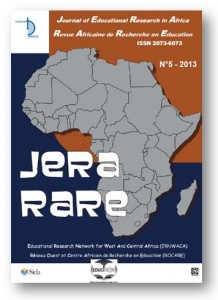Journal of Educational Research in Africa (JERA) / Revue Africaine de Recherche en Education (RARE), No. 5, 2013 May 13, 2014
The fifth edition of the Journal of Educational Research in Africa contains eight papers on educational issues in North and West Africa. They relate to technical training, higher education and curriculum reform as well as overeducation, child labor, religious pluralism at school, and the influence of mothers’ educational levels on their children’s academic performance. The paper abstracts are below.
—–
Le cinquième numéro de la Revue Africaine de Recherche en Education contient huit articles sur des questions ayant trait à l’éducation en Afrique du Nord et de l’Ouest. Les articles traitent des questions comme l’enseignement supérieur technique, le reforme curriculaire, la suréducation, ainsi que le travail des enfants, le pluralisme religieux à l’école, et l’influence du niveau d’éducation des mères sur la performance académique de leurs enfants. Les résumes des articles sont ci-dessous.
Papers in English /
Articles en anglais
Evolution of Polytechnic Education in Ghana, Emmanuel Newman
In 1992, polytechnic institutions operating as second-cycle educational institutions were elevated to tertiary status by the Government of Ghana to provide full-time courses in the field of manufacturing, commerce, science, technology, applied science, applied arts and technology. However, since the elevation of polytechnics to tertiary status, issues such as poor image of vocational and technical education, inadequate funding, poor conditions of service of staff relative to public universities have caused the staff of polytechnic institutions to make strenuous efforts to obtain the same status as universities in order to secure comparable resources from the public purse as public universities. These efforts at mimicking universities have blurred the mandate of polytechnic institutions and is gradually leading to the creation of a unitary tertiary education system in Ghana. This paper examines the major issues in polytechnic education in Ghana since their elevation in 1992 and how the staff of polytechnic institutions have responded to these issues. The changes taking place in polytechnic education in Ghana are examined within the framework of neo-institutional and resource dependency theories.
Assessment of Students with Visual Impairment: A Case Study of the University of Cape Coast, Ghana, K. Etsey, H. Owolabi, Kofi Ntim
This study aimed at understanding the practices adopted for the assessment of Students with Visual Impairment (SVIs) at the University of Cape Coast (UCC) in Ghana. We also inquired about problems encountered by SVIs in relation to their assessment. Data was collected from 35 SVIs and two staff persons of the University’s Resource Centre. The qualitative method was used alongside quantitative analysis in the form of frequency tables. It was found that testing conditions for SVIs that sit for their papers in the UCC Resource Centre were comparable to those of students that take their papers in the examination halls. Braille transcription of question papers, synchronization of the timing of papers for all students, and ensuring uniform instruction across centres were found as sources of challenge in the assessment of SVIs. Implications of these were discussed, and it was recommended that more training be provided to lecturers and staff of UCC’s Resource Centre to improve their assessment practices for SVIs.
Influence of Mothers’ Educational Attainment on Motivational Levels, Moral Behaviours, Health Conditions and Academic Performance of Children in Lagos State of Nigeria, Adesoji A. Oni, Jeremaiah. A. Adetoro
The study investigated the influence of mothers’ educational attainment on the growth and academic performance of children in Lagos State of Nigeria. The study adopted a descriptive survey design. Participants included 500 students of senior secondary II in the Agege Local Government area of Lagos State, Nigeria. Results revealed that highly educated mothers use every technique available to them to motivate their children to excel in their academic pursuits. The study also revealed that the moral attitude of the children has no relationship with their mothers’ educational attainment. However, there is a high degree of relationship between mothers’ educational attainments and the health conditions of their children. The children of the highly educated mothers perform better academically than those of the poorly educated mothers.
Résumé : L’étude enquête sur l’influence du niveau académique des mères sur le développement et la performance académique des enfants dans l’état de Lagos au Nigeria. L’étude a adopté un dessin d’enquête descriptif. Cinq cent étudiants de Senior Secondary II dans la région municipale de ont participé à l’étude. Les résultats de l’étude révèle que les mères bien lettrées motivent leurs enfants employant toute méthode connue pour que leurs enfants réussissent á l’école. L’étude démontre aussi que l’attitude morale des enfants ne correspond pas avec le niveau académique de leurs mères. Par contre, le niveau académique des mères a beaucoup d’influence sur la santé de leurs enfants. Enfin, les enfants des mères bien lettrées performent mieux á l’école que ceux des mères qui ne sont pas si lettrées.
Papers in French, with English language abstracts /
Articles en français
Schooling and child labour: the « educative » model in Mali in question /
Scolarisation et travail des enfants : le modèle « éducatif » malien en question, Siaka Koko KONE
For a long time, cultural values and the weight of traditions “legitimated and normalized” children’s work in Mali, as characteristic of agro-pastoral societies. Unfortunately, the unprecedented impoverishment of the populations tends to subordinate the phenomenon to a commercial logic, sometimes to the detriment of children’s physical and psychic heath. The present study questions the advisability today to refer to the children’s socialization by work argument. It explores, through a descriptive analysis completed by an econometric one, the factors that underlie households’ decisions concerning children’s school attendance or labour. The analyses are based on the exploitation of data from the National survey on child labour (ENTE) realized in 2005 by the National statistical office (DNSI) of Mali.
Résumé : Longtemps, les valeurs culturelles et le poids de la tradition ont « légitimé et normalisé » le travail des enfants au Mali, à l’instar des sociétés agropastorales. Malheureusement, la paupérisation sans précédent des populations tend à subordonner le phénomène à une logique marchande, au détriment de la santé physique et psychique des enfants. La présente étude interroge l’opportunité d’invoquer aujourd’hui encore l’argument d’une socialisation des enfants par le travail. Elle explore, à travers une analyse descriptive puis économétrique, les facteurs qui sous-tendent les décisions des ménages quant à la scolarisation ou à la mise au travail des enfants. Les analyses s’appuient sur l’exploitation des données recueillies au cours de l’Enquête sur le travail des enfants (ENTE) réalisée en 2005 par la Direction nationale de la statistique et de l’information (DNSI) du Mali.
Religious pluralism at school: Dynamism or dynamite? /
Pluralisme religieux à l’école : Dynamisme ou dynamite, Stephen Kizito FORBI
The existence of many religions in the same school raises important questions vital for its survival: Is religion a vector of value transmission? How can one bring about peaceful coexistence of religions? The stakes of religious pluralism are high. Culturally, religious pluralism calls for a redefinition of school identity. From the standpoint of socialization, it demands negotiations in view of reconstruction of school unity. Democratically, it raises the question of whether students should be left the choice to study religion or whether religious education should be imposed on all indiscriminately. Two solutions are proposed: lay education and citizenship education. Lay education is founded on religious freedom of individual students, whereas citizenship education is construed on the recognition of the other in his/her difference. In short, religious pluralism questions the regulatory capacity of the school.
Résumé : La présence de plusieurs religions dans une même école pose des questions qui sont cruciales pour son survie : La religion est-elle un véhicule de l’enseignement ? Que faire pour qu’il y ait une cohabitation pacifique entre ces religions ? Les enjeux du pluralisme religieux scolaire sont de taille. Culturellement, le pluralisme religieux exige la redéfinition de l’identité de l’école. De point de vue de la socialisation, il exige une négociation pour la reconstruction d’une nouvelle unité scolaire. Démocratiquement, faut-il laisser le cours de la religion au choix ou faut-il l’imposer à tous sans discrimination ? Deux solutions sont possibles, à savoir, l’option pour la laïcité scolaire ou celle pour l’éducation à la citoyenneté. La laïcité encourage l’autonomie et la liberté religieuse individuelle alors que l’éducation à la citoyenneté construit la liberté religieuse sur la reconnaissance des autres dans leur différence. Bref, le pluralisme religieux questionne la capacité régulatrice de l’école.
What approaches to reform the curriculum and school in Africa? /
Quelles approches pour réformer le curriculum et l’école en Afrique ? Constats et controverses, T. Lauwerier, A. Akkari
The main objective of this paper is to analyze the major curriculum reforms as implemented in basic education in Africa during the last ten years. We focus on the competency-based approach, which has been embraced with enthusiasm in many African countries. First, we analyze the reasons for choosing this approach. Then, we highlight the factors which hinder the effects of curricular reforms targeting the improvement of education quality in two contexts: North Africa and West Africa. Finally, we reflect on possibilities for appropriate curriculum development in the African educational context.
Résumé : L’objectif principal de cet article est de synthétiser les principales orientations curriculaires observées en Afrique durant les dix dernières années en éducation de base. Nous nous focalisons plus particulièrement sur l’approche par compétences qui jouit d’un engouement important dans la région. Nous analysons dans un premier temps les raisons du choix de cette approche sur le continent. Ensuite, nous mettons en évidence les facteurs qui limitent les effets des réformes curriculaires sur l’amélioration de la qualité de l’éducation scolaire dans deux contextes, l’Afrique du Nord et l’Afrique de l’Ouest. Enfin, nous dégagons quelques pistes de réflexion sur les possibilités d’un développement curriculaire approprié pour le contexte éducatif africain.
Gaps between the official and the implemented curriculum: Secondary school teacher practices in environmental education in Benin /
Du curriculum officiel au curriculum implanté: Les pratiques enseignantes en éducation relative à l’environnement au secondaire en République du Bénin, Jean-Philippe AYOTTE-BEAUDET, Patrick CHARLAND
Francophone West Africa is taking part in the international trend toward standardization of educational systems. The reform of secondary education progressively implemented from 2005 in Benin prescribed changes in teaching practices, especially due to the shift to a competency-based approach. To consider socioenvironmental problems, various elements of environmental education (EE) have been integrated into the curriculum. However, when an educational reform is implanted, there is generally a gap between the official curriculum and the implemented curriculum. This article aims to report on declared teaching practices in EE in secondary education in Benin. The variables of the didactic action described by Bru (2007) are used to analyze the interviews with teachers, principals, educational inspectors, actors of environmental NGOs in schools, and a civil servant of the ministry responsible for secondary education. Several variables of declared teaching practice in EE show a gap between the official curriculum and the implemented curriculum. Among other observations and results, the principal conclusion of this study concerns the training needs for teachers in education in general and particularly in EE.
Résumé : L’Afrique de l’Ouest francophone prend aujourd’hui part au courant d’harmonisation des systèmes éducatifs. La réforme de l’enseignement secondaire implantée à partir de 2005 au Bénin a ainsi prescrit des transformations aux pratiques enseignantes, surtout en raison du basculement vers une approche par compétence. Pour considérer les problèmes socioenvironnementaux du pays, on y a intégré divers éléments d’éducation relative à l’environnement (ERE). Toutefois, lorsque s’opérationnalise une réforme éducative, on constate généralement un décalage entre le curriculum officiel et le curriculum implanté. Cet article vise ainsi à caractériser les pratiques enseignantes déclarées en matière d’ERE au secondaire au Bénin. Les variables de l’action didactique décrites par Bru (2007) servent de cadre d’analyse des entretiens réalisés avec des enseignants, des directeurs d’établissements, des inspecteurs pédagogiques, des acteurs d’ONG en environnement à l’école et un fonctionnaire du ministère responsable de l’enseignement secondaire. Plusieurs variables de la pratique enseignante déclarée en ERE montrent un écart entre le curriculum officiel et le curriculum implanté. Au départ des résultats, la principale conclusion de cet article concerne les besoins de formation en matière d’enseignement en général et plus particulièrement en ERE.
Fuzzy sets theory: application to overeducation analysis in Cameroon
La théorie des ensembles flous : application à l’analyse de la suréducation au Cameroun, Njifen M. ISSOFOU
Workers are deemed to be overeducated if their acquired skills exceed the skills required to perform their current job. Overeducation of workers is diagnosed in traditional approaches (normative statistical and subjective) by setting a standard of education required. However, the choice of the standard is questionable because it is more or less dependent on subjective assumptions and normative or statistical standards. In addition, dichotomous restitution of individual situations between “overeducated” and “not overeducated” ignores the overeducation intensity, which does not seem very appropriate to apprehend reality. To overcome this difficulty, this study, inspired by recent work on the measurement of poverty, mobilizes the fuzzy sets theory in an attempt to construct a measure of overeducation in Cameroon. This method is recommended to analyze situations, such as overeducation, in which knowledge is uncertain and imprecise.
Résumé: La suréducation a fait l’objet d’estimations dans beaucoup de pays. Dans cette littérature, la suréducation est pour un travailleur le fait de posséder un niveau de formation a priori supérieur à celui requis pour l’emploi qu’il occupe. Du point de vue méthodologique, l’identification des travailleurs suréduqués repose ainsi sur des mesures distinctes qui sont loin de converger sur un même ordre de grandeur du phénomène. Dans les approches traditionnelles notamment normative, statistique et subjective, le diagnostic des travailleurs suréduqués est rendu possible par la définition d’une norme d’éducation requise. Pourtant, le choix de cette norme est discutable parce qu’il est plus ou moins subjectif et dépend d’hypothèses de type normatif ou statistique. En outre, la restitution dichotomique des situations individuelles entre « suréduqués » et « non suréduqués » ignore de fait l’intensité de la suréducation, ce qui ne semble pas très adaptée pour appréhender la réalité. Pour surmonter cette difficulté, la présente étude, s’inspirant des travaux récents sur la mesure de la pauvreté, mobilise la théorie des ensembles flous (fuzzy sets) pour tenter de construire une mesure de la suréducation au Cameroun. Cette méthode est très préconisée à l’analyse des situations dont les connaissances sont incertaines et imprécises à l’instar de la suréducation.
[ Click to download / Cliquez pour télécharger ]
Click for partial access to the papers as well as Journal ordering information / Cliquez pour accéder aux extraits des papiers et pour savoir comment commander la Revue : www.ernwaca.org/biblio/opac_css/index.php?&lvl=categ_see&id=49&main=1&id_thes=1




Leave a Reply